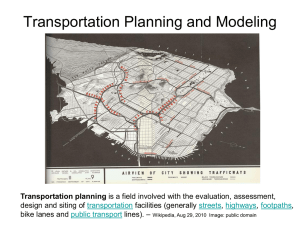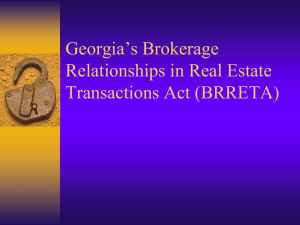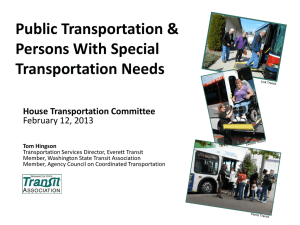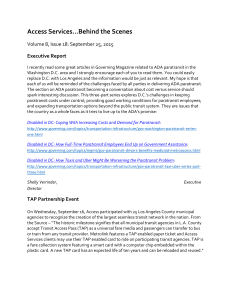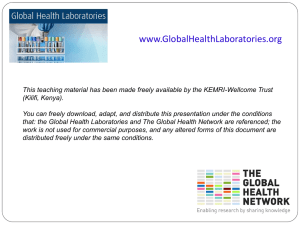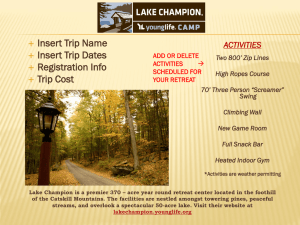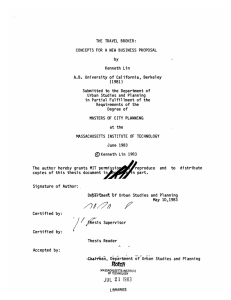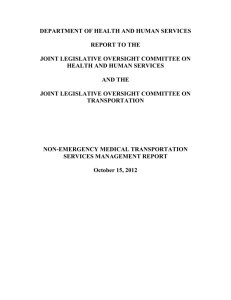WA Brokerage Model- Speaker Christie Scheffer ()
advertisement
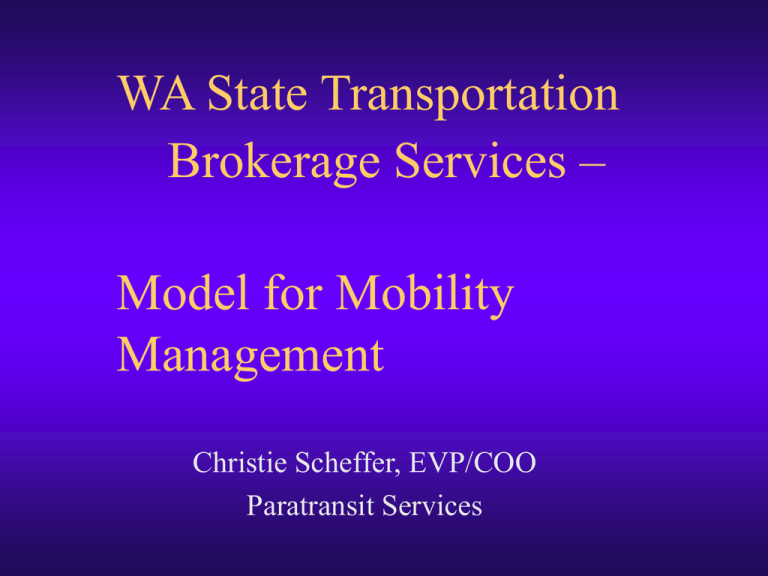
WA State Transportation Brokerage Services – Model for Mobility Management Christie Scheffer, EVP/COO Paratransit Services PARATRANSIT SERVICES Private, Non-profit since 1980 – specializes in transportation call centers, Medicaid brokerages, and public transit operations in California, Washington and Oregon. Piloting Broker in WA State – Currently provide brokerage services for 9 counties, brokering over 1 million trips per year. What Is A Transportation Broker A firm that specializes in: – arranging and monitoring transportation services for individuals with special needs while ensuring funders regulatory requirements are being met. The WA State Brokerage System The system was established in 1988 by DSHS to Broker Non-Emergency Medical Transportation The Brokerage System is a state-wide system with 6 Brokerages providing services to 13 regions. In 2002, DSHS added Interpreter Services Subcontracts with an established network of providers. Provides Rural and Urban transportation. WA State - Persons/Sq. Mile Medical Assistance Administration Transportation Brokers San Juan Whatcom Pend Oreille Okanogan Island Ferry Region 3A Stevens Skagit Region 1B Clallam Region 3B Region 6A Region 1A Snohomish Jefferson Region 4 Chelan Spokane Lincoln Douglas Region 1D Kitsap King Maso n Pierce Grays Harbor Thurston Region 1C Kittitas Grant Whitma n Adams Region 5 Region 1D Region 6B Pacific Franklin Lewis Cowlitz Skamania Region 2 Benton Region 6C Klickitat Note: Mason County is divided, with the Northern half in Region 5 and the Southern half in Region 6. As of January 1, 2011 Columbia Yakima Wahkiakum Clar k Garfield Walla Walla Asotin NEMT Pyramid 4 Full-Time DSHS/MAA Managers Average “Internal” Cost: Less Than $0.25/Trip 6 Independent Brokers Serve 13 Regions Statewide Average “Administrative” Contract Cost: About $3.05/Trip 165+ Subcontractors & 26 Transit Agencies Provide Trips Using 6,000 Vehicles Average “Service” Contract Cost: About $17.01/Trip Clients currently receiving 2.9 Million Trips/Year: That’s About 11,155 Trips/Day – EVERY DAY! Total Contract Cost: About $20/Trip What Does A Transportation Broker Provide Ensures adequate resources are available Matches client need with lowest cost, most appropriate resource Ensures cost efficiency Ensures system safety Ensures Regulatory Compliance (local, state, federal, etc.) Brokerage services include: Call/Contact Center: Eligibility screening, Reservations, Scheduling and Dispatch Contract Administration Quality Assurance Billing and Auditing Driver Training and Drug & Alcohol Consortium services Matches client need with available resources Available resources include but not limited to: – – – – – – Bus passes Mileage Reimbursement and Fuel Cards Sedans and Vans Wheelchair Accessible Vehicles Volunteer Networks Lodging and Meals; Commercial bus, air, train Ensures Cost Efficiency Finds lowest cost most appropriate mode of service Share rides to eliminate duplication of services Creates competition between transportation companies to ensure best cost solutions Fraud prevention protocols Ensures System Safety Operator and Pre-Employment Standards Training Standards Vehicle Standards Service Standards Reporting Standards Insurance Requirements Rider Standards Technological support Online Trip Request, trip check and cancel IVR system – calls with next day trip reminder Online Transportation Provider Net – – Receive trip information online – Perform Billing online Online request for Interpreter Services and other programs Scheduling Software and phone system Once the Brokerage is established, other services can now be added! Interpreter Services McKinney Vento Transportation Beyond the Borders Other types of Coordination Interpreter Services Established in 2002 Medical Providers contact Brokerage for IS Broker contracts with IS Agencies Projected to save $8 million in first 2 years. Real savings- $8 million in first 6 months Currently saving $1 mil. per mo McKinney Vento Transportation The No Child Left Behind Act – unfunded mandate Project Partners: Paratransit Services, one other WA State Brokerage, six school districts and PSESD. The School Districts contact the Brokerage for their county, and refer students for transportation. Created significant administrative efficiencies. Beyond the Borders Project Partners: Pierce Transit, Paratransit Services, and Pierce County Community Services. Funds: Special Needs, JARC and Community Development Block grant funds Connect people who live outside of the transit boundary to essential services by bringing them into the transit service area, using Broker Transportation Providers to transport to the nearest Park & Ride. Other Types of Coordination Tribal connections – 2 examples – Feeder route – Tribal Transportation Providers Major Urban Medical Center – onsite Mobility Management Kiosk Volunteer center Sponsor-A-Ride (donation system) Veterans Project (allow Veterans to piggy-back existing DSHS trips) (goal is to turn this into a rural shuttle) Caregiver Transport Meal Site Rural Medical Shuttle – Partners: DOT grant, Medicaid, Medical Partner and transit funding (gen. public may ride/min.$) Gorge Translink- 5 counties/2 states – coordinates transport along 200 mile corridor in OR and WA Brokerage Model Benefits Provides infrastructure to coordinate a variety of services Ensures adequate resources are available (transportation providers or Interpreters) Matches client need with available resources Ensures cost efficiency Benefits to the Users Ensures system safety Ensures Regulatory Compliance (local, state, federal, etc.) Continues to expand capacity for mobility management and coordination by leveraging resources of various funders. Contact: Christie Scheffer, EVP/COO Paratransit Services cls@paratransit.net

